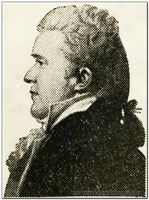Philip Doddridge (politician)
Philip Doddridge (born May 17, 1773 in Bedford County , Colony of Virginia , † November 19, 1832 in Washington, DC ) was an American politician . Between 1829 and 1832 he represented the state of Virginia in the US House of Representatives .
Career
Philip Doddridge grew up on a farm. He later moved to Brooke County in what is now West Virginia , where he attended public schools. After completing a law degree, he was admitted to the bar in 1797. At the same time he embarked on a political career. Between 1804 and 1809 he was a member of the Virginia Senate . From 1815 to 1829 he sat several times in the House of Representatives of his state. In 1829 he was a delegate to a meeting to revise the Virginia Constitution. In 1822 and 1824 he ran unsuccessfully for Congress . In the 1820s he joined the movement against future President Andrew Jackson and became a member of the short-lived National Republican Party .
In the congressional elections of 1828 Doddridge was elected to the US House of Representatives in Washington in the 18th electoral district of Virginia, where he succeeded Isaac Leffler on March 4, 1829 . After a re-election he could remain in Congress until his death on November 19, 1832. Since President Jackson took office in 1829, there has been heated debate inside and outside of Congress about its policies. It was about the controversial enforcement of the Indian Removal Act , the conflict with the state of South Carolina , which culminated in the nullification crisis , and the banking policy of the president.
In the House of Representatives, Doddridge chaired the District of Columbia Administration Committee . After his death, Joseph Johnson became a member of the MP .
Web links
- Philip Doddridge (politician) in the Biographical Directory of the United States Congress (English)
- Philip Doddridge in the database of Find a Grave (English)
| personal data | |
|---|---|
| SURNAME | Doddridge, Philip |
| BRIEF DESCRIPTION | American politician |
| DATE OF BIRTH | May 17, 1773 |
| PLACE OF BIRTH | Bedford County , Virginia |
| DATE OF DEATH | November 19, 1832 |
| Place of death | Washington, DC |

